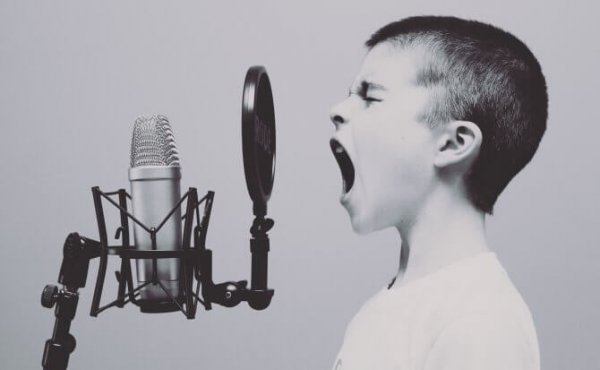What Does Your Tone of Voice Convey?

Multiple people can say the same sentence, and their different tones of voice will convey different psychological information. It shows you how there’s both verbal and nonverbal meaning in all our words. The nonverbal part is harder to control, so it’s also more genuine.
“60% of all human communication is non-verbal, 30% is your tone; so that means that 90% of what you’re saying, ain’t coming out of your mouth.”
-Hitch-
You can also figure out a lot about how someone is doing by examining their tone of voice. Even if they’re talking in a language you don’t know, you can figure something out about how they feel and think just by listening to how they talk. Now we’ll give you a few ideas about how to interpret what someone’s tone of voice is telling you.

Tone of voice and perception
The Laboratory of Instrumental Analysis of Communication at the Autonomous University of Barcelona did a study about tone of voice and perception. They had some interesting findings, and here are some of them:
- A deep tone of voice implies maturity and generates trust in other people. It’s also a common tone in advertisements.
- If someone’s tone of voice is extremely deep, it actually conveys a dark feeling.
- A firm, confident tone of voice makes you think the person talking is distinguished and important.
- Talking in a quiet tone of voice makes you think the person has major weaknesses or is awkward.
- People who have a really high tone of voice don’t convey much credibility.
Voice is such a personal detail that now it’s being used as a way to check identity and let people access their technology. It’s also valid as evidence in a trial. It’s just as (and maybe even more) reliable than a fingerprint.

Other interesting facts
Psychologists have made an effort to identify the hidden meanings behind different tones of voice. Now we have a huge catalog of interpretations for these small details, the kind that go unnoticed by most of us. Let’s look at some of them.
Breathing
The way someone breathes while they talk gives an idea of the pace they live their life at.
- Calm: someone very balanced is talking.
- Deep and constant: energy and activity.
- Deep, constant, and strong: bottled up anger.
- Superficial: a lack of practicality.
- Short and quick: anxiety, distress.
Volume
This generally defines how someone interacts with themselves and others:
- Normal: self-control and the ability to listen.
- High: weakness, selfishness, and impatience.
- Low: inexperience and inhibition
Articulation or vocalization
Vocalization has to do with someone’s ability to be understood and their desire to be understood:
- Well-defined: mental clarity, openness to communication.
- Imprecise: deceit or mental confusion.
- Very clear: narcissism, tension.
- Stumbling: aggressiveness, inhibition.
Speed
This will tell you about the emotional state the person is in:
- Slow: lack of interest, disconnection from the world.
- Fast: tension, desire to hide information.
- Regular: holding back, bottling up, unnatural.
- Irregular: confusion, anxiety, communication breakdown.

Voice and relations
Tone of voice is like a stamp. Even if the person they’re talking to isn’t an expert in this subject, they unconsciously receive a messages from the other person’s tone of voice. And these messages will shape the image they have of that person.
Tone of voice also conveys the type of relationship a person wants to have with someone else. So if they’re cold and sharp, they want to establish some distance. And if they’re warm and sweet, they’re trying to get closer. The tone of voice defines the tone of the bond.
It’s also important to point out that a person’s tone of voice isn’t always the same. But there are still some things that are always there. Those are the consistent patterns that will give you the key to someone’s personality or mood.
A good way to practice self-knowledge is to record yourself in different scenarios and then listen for those hidden tones in your voice. Tone of voice is a great tool for communication and forming relationships. And that’s exactly why it’s a tool that’s so worth learning to use.
Multiple people can say the same sentence, and their different tones of voice will convey different psychological information. It shows you how there’s both verbal and nonverbal meaning in all our words. The nonverbal part is harder to control, so it’s also more genuine.
“60% of all human communication is non-verbal, 30% is your tone; so that means that 90% of what you’re saying, ain’t coming out of your mouth.”
-Hitch-
You can also figure out a lot about how someone is doing by examining their tone of voice. Even if they’re talking in a language you don’t know, you can figure something out about how they feel and think just by listening to how they talk. Now we’ll give you a few ideas about how to interpret what someone’s tone of voice is telling you.

Tone of voice and perception
The Laboratory of Instrumental Analysis of Communication at the Autonomous University of Barcelona did a study about tone of voice and perception. They had some interesting findings, and here are some of them:
- A deep tone of voice implies maturity and generates trust in other people. It’s also a common tone in advertisements.
- If someone’s tone of voice is extremely deep, it actually conveys a dark feeling.
- A firm, confident tone of voice makes you think the person talking is distinguished and important.
- Talking in a quiet tone of voice makes you think the person has major weaknesses or is awkward.
- People who have a really high tone of voice don’t convey much credibility.
Voice is such a personal detail that now it’s being used as a way to check identity and let people access their technology. It’s also valid as evidence in a trial. It’s just as (and maybe even more) reliable than a fingerprint.

Other interesting facts
Psychologists have made an effort to identify the hidden meanings behind different tones of voice. Now we have a huge catalog of interpretations for these small details, the kind that go unnoticed by most of us. Let’s look at some of them.
Breathing
The way someone breathes while they talk gives an idea of the pace they live their life at.
- Calm: someone very balanced is talking.
- Deep and constant: energy and activity.
- Deep, constant, and strong: bottled up anger.
- Superficial: a lack of practicality.
- Short and quick: anxiety, distress.
Volume
This generally defines how someone interacts with themselves and others:
- Normal: self-control and the ability to listen.
- High: weakness, selfishness, and impatience.
- Low: inexperience and inhibition
Articulation or vocalization
Vocalization has to do with someone’s ability to be understood and their desire to be understood:
- Well-defined: mental clarity, openness to communication.
- Imprecise: deceit or mental confusion.
- Very clear: narcissism, tension.
- Stumbling: aggressiveness, inhibition.
Speed
This will tell you about the emotional state the person is in:
- Slow: lack of interest, disconnection from the world.
- Fast: tension, desire to hide information.
- Regular: holding back, bottling up, unnatural.
- Irregular: confusion, anxiety, communication breakdown.

Voice and relations
Tone of voice is like a stamp. Even if the person they’re talking to isn’t an expert in this subject, they unconsciously receive a messages from the other person’s tone of voice. And these messages will shape the image they have of that person.
Tone of voice also conveys the type of relationship a person wants to have with someone else. So if they’re cold and sharp, they want to establish some distance. And if they’re warm and sweet, they’re trying to get closer. The tone of voice defines the tone of the bond.
It’s also important to point out that a person’s tone of voice isn’t always the same. But there are still some things that are always there. Those are the consistent patterns that will give you the key to someone’s personality or mood.
A good way to practice self-knowledge is to record yourself in different scenarios and then listen for those hidden tones in your voice. Tone of voice is a great tool for communication and forming relationships. And that’s exactly why it’s a tool that’s so worth learning to use.
This text is provided for informational purposes only and does not replace consultation with a professional. If in doubt, consult your specialist.







